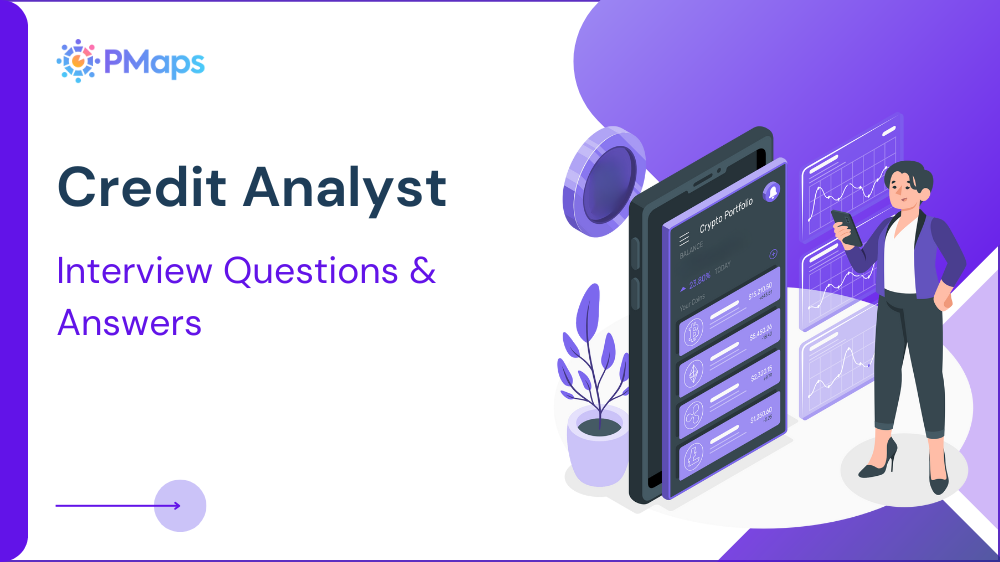
Credit Managers aren’t just gatekeepers of approvals—they’re architects of risk management frameworks that protect cash flow and shape portfolio quality. Hiring for this role demands more than surface-level vetting of finance experience or documentation habits.
According to the India Credit Risk Report 2023, 42% of lending institutions face overdue risk due to poor credit assessment protocols at the managerial level. A well-designed credit manager interview can fix this by identifying candidates who balance policy discipline with on-ground credit agility.
This guide offers 25 expertly framed credit manager interview questions and answers to help hiring teams:
- Assess analytical depth, risk bias, and approval logic
- Validate candidate experience with policy enforcement and collections
- Screen for ethical judgment in credit exposure decisions
Let’s start with general questions for credit manager interview setups that surface core professional values.
General Interview Questions for Credit Managers
At the base level, Credit Managers must balance compliance, business goals, and borrower psychology. Early questions in the credit manager interview help you uncover what drives their credit perspective and how they’ve evolved as decision-makers.
Sample Candidate Answer: I’ve always viewed credit management as the space where finance meets decision accountability. My interest in this role comes from a drive to shape credit health proactively—through better data filters, stronger client screening, and responsive approval models that still align with risk thresholds.
This reflects both operational engagement and strategic intent—exactly what’s needed in a modern credit control environment. Use these credit manager job interview questions and answers to assess alignment from day one:
1. What motivated you to work in credit management?
What it Assesses: Interest alignment and purpose clarity.
What to Listen For: They should link their motivation to credit policy, lending risk, portfolio performance, or exposure control—not generic finance duties.
2. How do you define a “good” credit decision?
What it Assesses: Judgment framing.
What to Listen For: Strong candidates will mention default probability, repayment history, financial behavior, and context—not just paperwork completeness.
3. What’s your approach when onboarding new clients or accounts?
What it Assesses: Process discipline.
What to Listen For: They should speak to documentation checks, risk scoring, past exposure review, and KYC validations—not just formality.
4. What financial ratios do you monitor most during credit evaluation?
What it Assesses: Analytical grounding.
What to Listen For: Expect mentions of DSCR, interest coverage ratio, current ratio, and leverage indicators—with context for each ratio's relevance.
5. How do you manage pressure from sales or business heads for risky approvals?
What it Assesses: Policy discipline and negotiation skill.
What to Listen For: Look for calm resistance, policy citation, risk communication, and structured escalation—not avoidance or blind approval.
Behavioral Interview Questions for Credit Managers
Great credit decisions aren’t made in spreadsheets—they’re shaped by real-time judgment, negotiation, and accountability under pressure. These credit manager interview questions and answers help uncover behavior patterns that influence repayment quality and institutional trust.
Sample Candidate Answer: During a quarterly portfolio review, I noticed repeated delays from a client previously rated green. Despite pressure to maintain the account, I escalated my concerns with historical payment analysis and market intelligence. We revised their exposure limits and flagged them for close monitoring. The client defaulted a month later, but we avoided major loss. That incident shaped my principle—act early, and act with facts.
This reflects early risk sensing, stakeholder management, and confidence in upholding financial controls. Here are five behavioral credit manager job interview questions and answers to assess real-time maturity:
1. Tell me about a time when you denied credit despite business pressure.
What it Assesses: Risk integrity and escalation maturity.
What to Listen For: Strong responses include data-backed decisions, proactive communication, and willingness to take the hit for doing the right thing.
2. Describe a situation where a client defaulted under your portfolio. How did you manage it?
What it Assesses: Post-risk response and learning behavior.
What to Listen For: Candidates should detail mitigation steps, recovery attempts, stakeholder updates, and changes implemented afterward—not just blame assignment.
3. Share an example of when you improved a credit approval process.
What it Assesses: Process ownership and innovation.
What to Listen For: Look for automation, scoring enhancements, documentation simplification, or flagging systems to reduce cycle time and improve accuracy.
4. Talk about a time when your recommendation was ignored and risk materialized.
What it Assesses: Emotional maturity and influence tracking.
What to Listen For: They should reflect on how they escalated, what they documented, and how they ensured that mistake wasn’t repeated—not just “I told you so.”
5. When have you had to train or guide junior analysts?
What it Assesses: Mentorship and team strengthening.
What to Listen For: Good answers will reference SOP sharing, coaching on ratio interpretation, or explaining approval logic—not just task delegation.
Situational Interview Questions for Credit Managers
Situational questions assess how a candidate might act when standard policy isn’t enough—when borrower behavior, business targets, and incomplete data collide. These credit managers interview questions and answers surface critical thinking, escalation logic, and risk containment instinct.
Sample Candidate Answer: In one instance, a high-profile client requested a credit limit increase two days before quarter close, but their receivable days had spiked. I paused the request, flagged their ageing analysis, and escalated the anomaly. I then negotiated conditional approval tied to immediate part-payment. This safeguarded exposure while preserving the relationship.
This demonstrates quick situational assessment, data-driven intervention, and balance between caution and business continuity. Use these credit manager job interview questions to examine candidates’ responses under realistic constraints:
1. A client requests urgent credit after breaching prior terms. How do you respond?
What it Assesses: Control mindset under pressure.
What to Listen For: Look for reevaluation of credit score, past behavior analysis, structured risk mitigation, and adherence to policy escalation.
2. How would you handle a sales team pushing for approval on a borderline account?
What it Assesses: Cross-functional integrity and conflict resolution.
What to Listen For: Responses should show collaboration without compromise—offering structured options, not blank checks.
3. You inherit a portfolio with 15% delinquency. What’s your first move?
What it Assesses: Portfolio triage logic.
What to Listen For: Expect segmentation by risk bands, identification of chronic defaulters, communication strategy for collections, and documentation cleanup.
4. Your analyst flags a discrepancy, but the client threatens to escalate. What do you do?
What it Assesses: Client diplomacy and data defense.
What to Listen For: They should describe calm conflict handling, process transparency, verification trail, and involving senior review only if needed.
Technical or Functional Interview Questions for Credit Managers
Credit Managers must do more than approve or deny—they must analyze balance sheets, monitor repayment behavior, and maintain compliance with both internal frameworks and external regulations. These credit manager interview questions and answers target the precision and policy logic behind their everyday decisions.
Sample Candidate Answer: I rely on a weighted risk matrix that includes DSCR, current ratio, past repayment history, and industry exposure limits. For high-value requests, I run multiple what-if scenarios using Excel models with sensitivity bands. Every approval I make is logged with rationale, documentation, and audit trail compliance.
This illustrates data grounding, structured logic, and audit-ready control—key markers of a seasoned Credit Manager. Here are five credit manager job interview questions and answers to evaluate functional command:
1. Which financial ratios do you prioritize during credit evaluation?
What it Assesses: Analytical expertise.
What to Listen For: They should mention DSCR, current ratio, interest coverage ratio, asset turnover, and context for their use across sectors.
2. How do you structure your credit evaluation workflow?
What it Assesses: Process architecture.
What to Listen For: Expect a clear stepwise process—from application review and financial analysis to policy checks, scoring, and approval authority.
3. What systems or tools have you used in credit decision-making?
What it Assesses: Technology fluency.
What to Listen For: Look for ERP or credit scoring software, Excel-based modelling, and systems integration with CRM or collections tools.
4. How do you monitor portfolio performance?
What it Assesses: Ongoing risk control.
What to Listen For: Answers should reference MIS dashboards, DPD (days past due) analysis, early warning signals, and account health scoring.
5. How do you ensure compliance with internal and regulatory norms?
What it Assesses: Control and audit mindset.
What to Listen For: They should cite RBI/NBFC/FI guidelines (as applicable), internal audit checklists, exception management logs, and documentation for deviations.
Pro Tips for Interviewing Credit Managers
At the managerial level, success isn’t just about approving the right accounts—it’s about consistently applying structured credit thinking across portfolios and teams. These tips help interviewers uncover logic, discipline, and real-world risk experience.
1. Don’t just ask what ratios they use—ask how they decide
Force candidates to explain why certain ratios matter more in specific industries or deal sizes. It reveals judgment over textbook knowledge.
2. Ask for one policy they’ve changed and why
If they’ve never challenged a policy or flagged a systemic risk, they’re likely passive enforcers, not credit leaders.
3. Cross-check their risk appetite through case scenarios
Create a borderline profile with mixed signals. Watch how they navigate ambiguity—whether they anchor decisions in metrics, instincts, or caution.
4. Validate system awareness with tool walkthroughs
If they mention credit scoring software or models, ask them to describe one. Fluency matters more than name-dropping platforms.
5. Align with KPIs from the credit manager job description
Use internal benchmarks like approval turnaround time, delinquency rate, or audit compliance to frame sharper, outcome-driven questions.
Conclusion
Credit risk doesn’t only live in numbers—it shows up in judgment, documentation hygiene, and team alignment. These 25 curated credit manager interview questions and answers are designed to help you filter not just financial literacy but decision integrity and compliance ownership.
To streamline hiring and align interview questions with performance outcomes, refer to our credit manager job description for KPIs like delinquency rates, risk tiering accuracy, and approval cycle time. For added precision, consider administering a credit manager test to assess scenario-based reasoning and credit exposure control before onboarding.Need help structuring your finance hiring workflow? Call us at 8591320212 or write to assessment@pmaps.in.









